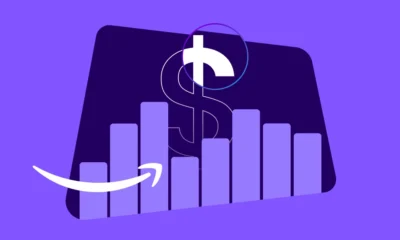SEO
Google’s Search Engine Market Share Drops As Competitors’ Grows

According to data from GS Statcounter, Google’s search engine market share has fallen to 86.99%, the lowest point since the firm began tracking search engine share in 2009.
The drop represents a more than 4% decrease from the previous month, marking the largest single-month decline on record.
U.S. Market Impact
The decline is most significant in Google’s key market, the United States, where its share of searches across all devices fell by nearly 10%, reaching 77.52%.
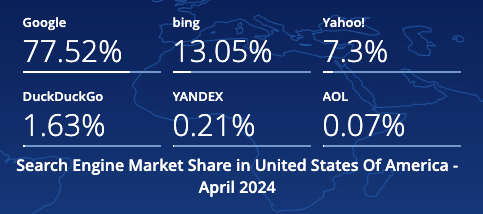 Screenshot from: https://gs.statcounter.com/search-engine-market-share/, May 2024.
Screenshot from: https://gs.statcounter.com/search-engine-market-share/, May 2024.Concurrently, competitors Microsoft Bing and Yahoo Search have seen gains. Bing reached a 13% market share in the U.S. and 5.8% globally, its highest since launching in 2009.
Yahoo Search’s worldwide share nearly tripled to 3.06%, a level not seen since July 2015.
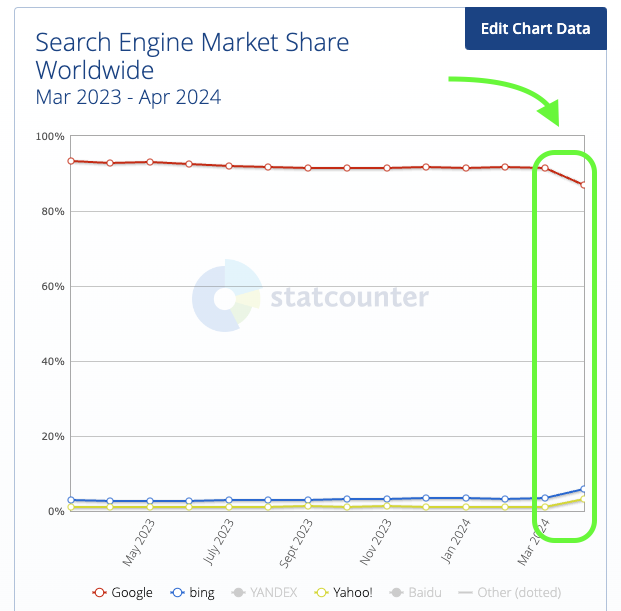 Screenshot from: https://gs.statcounter.com/search-engine-market-share/, May 2024.
Screenshot from: https://gs.statcounter.com/search-engine-market-share/, May 2024.Search Quality Concerns
Many industry experts have recently expressed concerns about the declining quality of Google’s search results.
A portion of the SEO community believes that the search giant’s results have worsened following the latest update.
These concerns have begun to extend to average internet users, who are increasingly voicing complaints about the state of their search results.
Alternative Perspectives
Web analytics platform SimilarWeb provided additional context on X (formerly Twitter), stating that its data for the US for March 2024 suggests Google’s decline may not be as severe as initially reported.
From our data (Search Engine website category, US, March 2024) it doesn’t look like we’re there yet: pic.twitter.com/RBUJp4ZLeb
— Similarweb (@Similarweb) May 1, 2024
SimilarWeb also highlighted Yahoo’s strong performance, categorizing it as a News and Media platform rather than a direct competitor to Google in the Search Engine category.
Don’t underestimate Yahoo. They’re doing great. On our platform they’re categorized as News and Media, and hence not a direct competitor to Google in the Search Engine category. But they rank #10 worldwide, #6 in the US, and #1 in their category. Much higher than Bing and OpenAI. pic.twitter.com/O4yJu5QEK6
— Similarweb (@Similarweb) May 2, 2024
At the same time, Google is slightly declining 👀 pic.twitter.com/9i7paeU1QG
— Similarweb (@Similarweb) May 2, 2024
Why It Matters
The shifting search engine market trends can impact businesses, marketers, and regular users.
Google has been on top for a long time, shaping how we find things online and how users behave.
However, as its market share drops and other search engines gain popularity, publishers may need to rethink their online strategies and optimize for multiple search platforms besides Google.
Users are becoming vocal about Google’s declining search quality over time. As people start trying alternate search engines, the various platforms must prioritize keeping users satisfied if they want to maintain or grow their market position.
It will be interesting to see how they respond to this boost in market share.
What It Means for SEO Pros
As Google’s competitors gain ground, SEO strategies may need to adapt by accounting for how each search engine’s algorithms and ranking factors work.
This could involve diversifying SEO efforts across multiple platforms and staying up-to-date on best practices for each one.
The increased focus on high-quality search results emphasizes the need to create valuable, user-focused content that meets the needs of the target audience.
SEO pros must prioritize informative, engaging, trustworthy content that meets search engine algorithms and user expectations.
Remain flexible, adaptable, and proactive to navigate these shifts. Keeping a pulse on industry trends, user behaviors, and competing search engine strategies will be key for successful SEO campaigns.
Featured Image: Tada Images/Shutterstock
SEO
Google Hints At Improving Site Rankings In Next Update
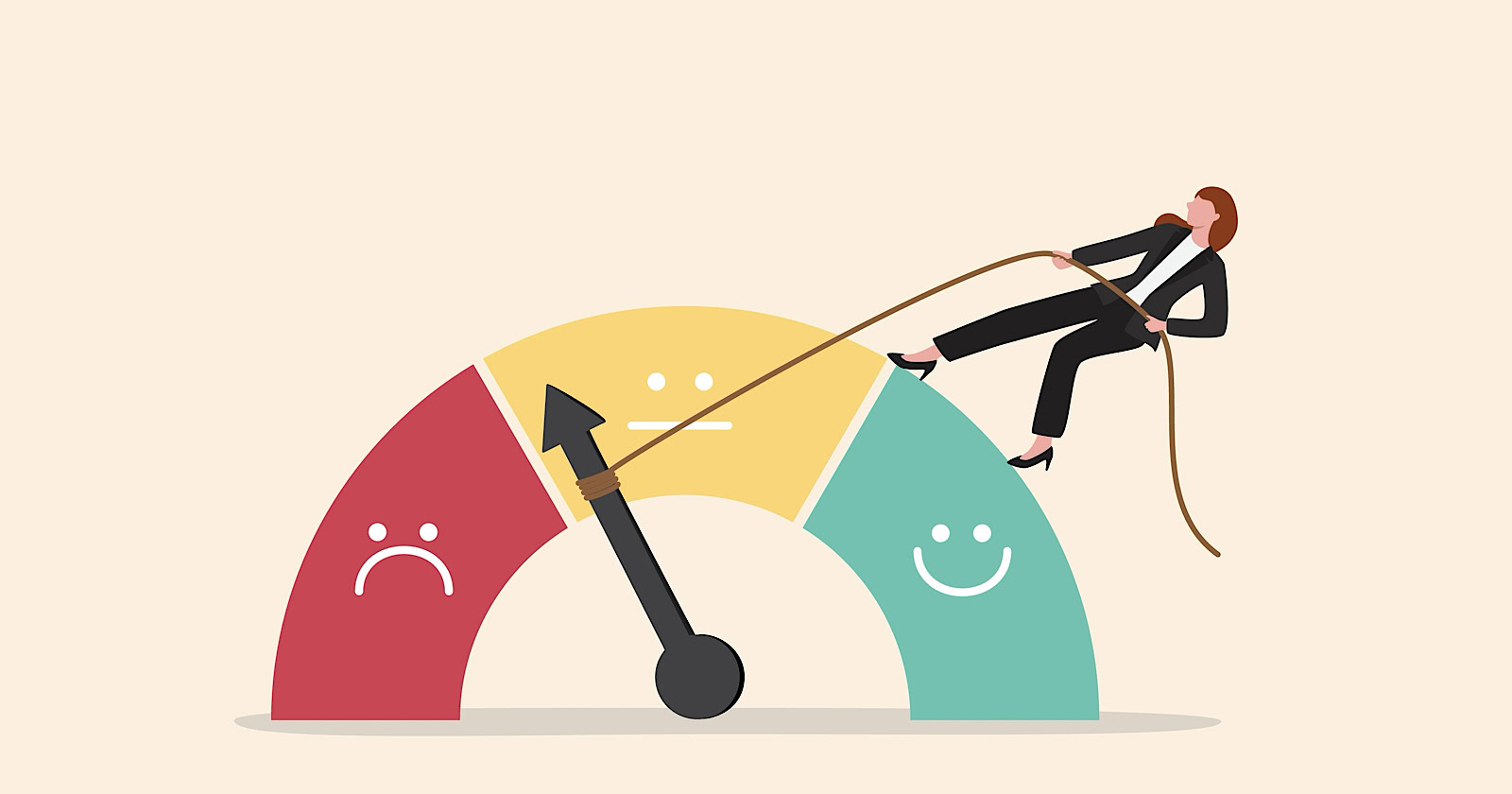
Google’s John Mueller says the Search team is “explicitly evaluating” how to reward sites that produce helpful, high-quality content when the next core update rolls out.
The comments came in response to a discussion on X about the impact of March’s core update and September’s helpful content update.
In a series of tweets, Mueller acknowledged the concerns, stating:
“I imagine for most sites strongly affected, the effects will be site-wide for the time being, and it will take until the next update to see similar strong effects (assuming the new state of the site is significantly better than before).”
He added:
“I can’t make any promises, but the team working on this is explicitly evaluating how sites can / will improve in Search for the next update. It would be great to show more users the content that folks have worked hard on, and where sites have taken helpfulness to heart.”
What Does This Mean For SEO Professionals & Site Owners?
Mueller’s comments confirm Google is aware of critiques about the March core update and is refining its ability to identify high-quality sites and reward them appropriately in the next core update.
For websites, clearly demonstrating an authentic commitment to producing helpful and high-quality content remains the best strategy for improving search performance under Google’s evolving systems.
The Aftermath Of Google’s Core Updates
Google’s algorithm updates, including the September “Helpful Content Update” and the March 2024 update, have far-reaching impacts on rankings across industries.
While some sites experienced surges in traffic, others faced substantial declines, with some reporting visibility losses of up to 90%.
As website owners implement changes to align with Google’s guidelines, many question whether their efforts will be rewarded.
There’s genuine concern about the potential for long-term or permanent demotions for affected sites.
Recovery Pathway Outlined, But Challenges Remain
In a previous statement, Mueller acknowledged the complexity of the recovery process, stating that:
“some things take much longer to be reassessed (sometimes months, at the moment), and some bigger effects require another update cycle.”
Mueller clarified that not all changes would require a new update cycle but cautioned that “stronger effects will require another update.”
While affirming that permanent changes are “not very useful in a dynamic world,” Mueller adds that “recovery” implies a return to previous levels, which may be unrealistic given evolving user expectations.
“It’s never ‘just-as-before’,” Mueller stated.
Improved Rankings On The Horizon?
Despite the challenges, Mueller has offered glimmers of hope for impacted sites, stating:
“Yes, sites can grow again after being affected by the ‘HCU’ (well, core update now). This isn’t permanent. It can take a lot of work, time, and perhaps update cycles, and/but a different – updated – site will be different in search too.”
He says the process may require “deep analysis to understand how to make a website relevant in a modern world, and significant work to implement those changes — assuming that it’s something that aligns with what the website even wants.”
Looking Ahead
Google’s search team is actively working on improving site rankings and addressing concerns with the next core update.
However, recovery requires patience, thorough analysis, and persistent effort.
The best way to spend your time until the next update is to remain consistent and produce the most exceptional content in your niche.
FAQ
How long does it generally take for a website to recover from the impact of a core update?
Recovery timelines can vary and depend on the extent and type of updates made to align with Google’s guidelines.
Google’s John Mueller noted that some changes might be reassessed quickly, while more substantial effects could take months and require additional update cycles.
Google acknowledges the complexity of the recovery process, indicating that significant improvements aligned with Google’s quality signals might be necessary for a more pronounced recovery.
What impact did the March and September updates have on websites, and what steps should site owners take?
The March and September updates had widespread effects on website rankings, with some sites experiencing traffic surges while others faced up to 90% visibility losses.
Publishing genuinely useful, high-quality content is key for website owners who want to bounce back from a ranking drop or maintain strong rankings. Stick to Google’s recommendations and adapt as they keep updating their systems.
To minimize future disruptions from algorithm changes, it’s a good idea to review your whole site thoroughly and build a content plan centered on what your users want and need.
Is it possible for sites affected by core updates to regain their previous ranking positions?
Sites can recover from the impact of core updates, but it requires significant effort and time.
Mueller suggested that recovery might happen over multiple update cycles and involves a deep analysis to align the site with current user expectations and modern search criteria.
While a return to previous levels isn’t guaranteed, sites can improve and grow by continually enhancing the quality and relevance of their content.
Featured Image: eamesBot/Shutterstock
SEO
Google Reveals Two New Web Crawlers

Google revealed details of two new crawlers that are optimized for scraping image and video content for “research and development” purposes. Although the documentation doesn’t explicitly say so, it’s presumed that there is no impact in ranking should publishers decide to block the new crawlers.
It should be noted that the data scraped by these crawlers are not explicitly for AI training data, that’s what the Google-Extended crawler is for.
GoogleOther Crawlers
The two new crawlers are versions of Google’s GoogleOther crawler that was launched in April 2023. The original GoogleOther crawler was also designated for use by Google product teams for research and development in what is described as one-off crawls, the description of which offers clues about what the new GoogleOther variants will be used for.
The purpose of the original GoogleOther crawler is officially described as:
“GoogleOther is the generic crawler that may be used by various product teams for fetching publicly accessible content from sites. For example, it may be used for one-off crawls for internal research and development.”
Two GoogleOther Variants
There are two new GoogleOther crawlers:
- GoogleOther-Image
- GoogleOther-Video
The new variants are for crawling binary data, which is data that’s not text. HTML data is generally referred to as text files, ASCII or Unicode files. If it can be viewed in a text file then it’s a text file/ASCII/Unicode file. Binary files are files that can’t be open in a text viewer app, files like image, audio, and video.
The new GoogleOther variants are for image and video content. Google lists user agent tokens for both of the new crawlers which can be used in a robots.txt for blocking the new crawlers.
1. GoogleOther-Image
User agent tokens:
- GoogleOther-Image
- GoogleOther
Full user agent string:
GoogleOther-Image/1.0
2. GoogleOther-Video
User agent tokens:
- GoogleOther-Video
- GoogleOther
Full user agent string:
GoogleOther-Video/1.0
Newly Updated GoogleOther User Agent Strings
Google also updated the GoogleOther user agent strings for the regular GoogleOther crawler. For blocking purposes you can continue using the same user agent token as before (GoogleOther). The new Users Agent Strings are just the data sent to servers to identify the full description of the crawlers, in particular the technology used. In this case the technology used is Chrome, with the model number periodically updated to reflect which version is used (W.X.Y.Z is a Chrome version number placeholder in the example listed below)
The full list of GoogleOther user agent strings:
- Mozilla/5.0 (Linux; Android 6.0.1; Nexus 5X Build/MMB29P) AppleWebKit/537.36 (KHTML, like Gecko) Chrome/W.X.Y.Z Mobile Safari/537.36 (compatible; GoogleOther)
- Mozilla/5.0 AppleWebKit/537.36 (KHTML, like Gecko; compatible; GoogleOther) Chrome/W.X.Y.Z Safari/537.36
GoogleOther Family Of Bots
These new bots may from time to time show up in your server logs and this information will help in identifying them as genuine Google crawlers and will help publishers who may want to opt out of having their images and videos scraped for research and development purposes.
Read the updated Google crawler documentation
Featured Image by Shutterstock/ColorMaker
SEO
ChatGPT To Surface Reddit Content Via Partnership With OpenAI

Reddit partners with OpenAI to integrate content into ChatGPT.
- Reddit and OpenAI announce a partnership.
- Reddit content will be used in ChatGPT.
- Concerns about accuracy of Reddit user-generated content.
-

 MARKETING5 days ago
MARKETING5 days ago18 Events and Conferences for Black Entrepreneurs in 2024
-

 SEO5 days ago
SEO5 days agoWhy Google Can’t Tell You About Every Ranking Drop
-
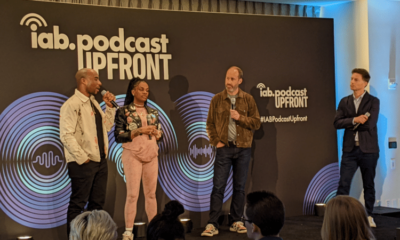
 MARKETING6 days ago
MARKETING6 days agoIAB Podcast Upfront highlights rebounding audiences and increased innovation
-

 MARKETING7 days ago
MARKETING7 days agoFoundations of Agency Success: Simplifying Operations for Growth
-
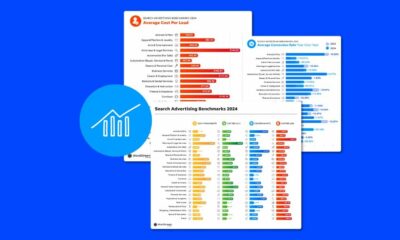
 PPC5 days ago
PPC5 days agoGoogle Ads Benchmarks 2024: New Trends & Insights for Key Industries
-
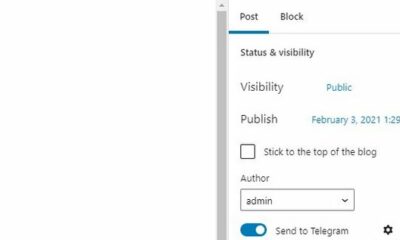
 WORDPRESS7 days ago
WORDPRESS7 days ago5 Must See Telegram Plugins for WooCommerce
-

 SEO6 days ago
SEO6 days agoHow To Use ChatGPT For Keyword Research
-

 PPC6 days ago
PPC6 days agoThe Ultimate Guide to Click Fraud






